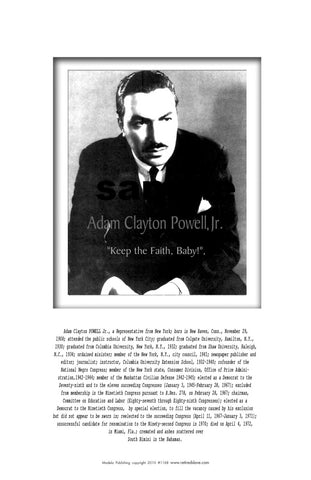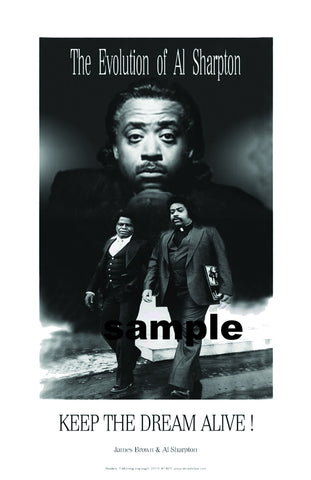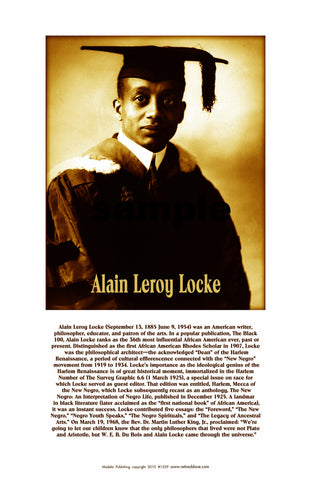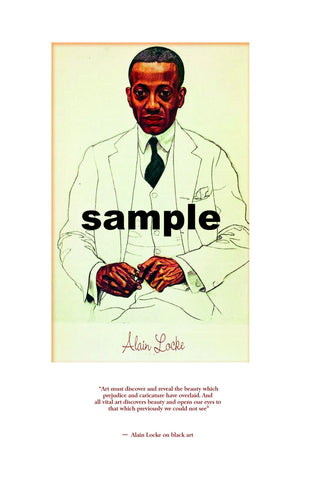W. E. B. DuBois #1002
$ 8.00
Caption from poster__
" Sit no longer blind, Lord God, deaf to our prayer
and dumb to our dumb suffering. Surely Thou
too art not white, O Lord, a pale, bloodless,
heartless thing?"
and dumb to our dumb suffering. Surely Thou
too art not white, O Lord, a pale, bloodless,
heartless thing?"
| W.E.B. Du Bois was born during the term of President Andrew Johnson and died the year that Lyndon Johnson became president. Du Bois was born and raised in Massachusetts, and graduated in 1888 from Fisk University, a black liberal arts college in Nashville, Tennessee. During the summer, he taught in a rural school and later wrote about his experiences in his book THE SOULS OF BLACK FOLK. |
| In 1895, Du Bois became the first African American to receive a Ph.D. in the subject of history from Harvard University. He then studied in Germany but ran out of funds before he could earn a post-doctoral degree. With the publication of THE PHILADELPHIA NEGRO: A SOCIAL STUDY in 1899, the first case study of a black community in the United States, as well as papers on black farmers, businessmen, and black life in Southern communities, Du Bois established himself as the first great scholar of black life in America. He taught sociology at Atlanta University between 1898 and 1910. Du Bois had hoped that social science could help eliminate segregation, but he eventually came to the conclusion that the only effective strategy against racism was agitation. He challenged the dominant ideology of black accommodation as preached and practiced by Booker T. Washington, then the most influential black man in America. Washington urged blacks to accept discrimination for the time being and elevate themselves through hard work and economic gain to win the respect of whites. In 1903, in his famous book THE SOULS OF BLACK FOLK, Du Bois charged that Washington's strategy kept the black man down rather than freed him. This attack crystallized the opposition to Booker T. Washington among many black intellectuals, polarizing the leaders of the black community into two wings -- the "conservative" supporters of Washington and his "radical" critics. In 1905, Du Bois took the lead in founding the short-lived Niagara Movement, intended to be an organization advocating civil rights for blacks. Although the Niagara Movement faltered, it was the forerunner of the National Association for the Advancement of Colored People (NAACP), which was founded in 1909. Du Bois played a prominent role in the organization's creation and became its director of research and the editor of its magazine, THE CRISIS. |
In the 1930s, Du Bois found himself in a bitter dispute with Walter White, the head of the NAACP, when Du Bois suddenly penned articles that advocated voluntary segregation, maintaining that black children would receive a better education from black teachers. Du Bois resigned from the editorship of THE CRISIS and the NAACP in 1934.
He taught for the next ten years at Atlanta University and published two of his major works, BLACK RECONSTRUCTION: AN ESSAY TOWARD A HISTORY OF THE PART WHICH BLACK FOLK PLAYED IN THE ATTEMPT TO RECONSTRUCT DEMOCRACY IN AMERICA 1860-1880 and DUSK OF DAWN. In 1951, when he was 83 years old, the federal government prosecuted Du Bois for his affiliation with the Communist Party. A judge eventually threw out the case. Disillusioned with the United States, he officially joined the Communist Party in 1961 and moved to Ghana; he renounced his American citizenship more than a year later.




